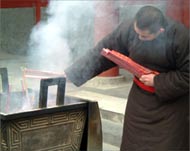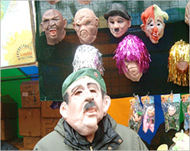New Year ritual back in vogue in China
Raising several incense sticks high above her head, Su Wei performs the requisite three bows towards the altar. Coming every year to offer prayers for the safety of her family is part of Su’s Chinese New Year ritual.

On Wednesday, Chinese worldwide heralded the arrival of the Year of the Rooster with family gatherings and firecrackers.
Based on the lunar calendar, red-faced Su is just one of several hundred worshippers who have braved sub-zero temperatures to give thanks at Beijing’s 300-year-old Lama Temple and ask for good fortune in the year ahead.
A traditional seasonal gesture, guards estimated that around 100,000 people would come during the weeklong national holiday – a further sign of how much China has changed since the early days of Communist rule when such acts of “feudal superstition” were widely discouraged.
Marketing dream
Non-believer Zhao Hongyi has enjoyed a profitable year in business and sees no point in tempting fate by not offering a few words of prayer.
 |
|
New Year celebrations are a sign |
Waiting for his son to return from out of town, one of 140 million Chinese who will travel over the holiday, he carries a bundle of different coloured incense sticks, dutifully lighting three at each of the numerous shrines dotting the temple complex.
A marketing dream, different coloured sticks, many inscribed with Chinese characters, indicate different requests.
Good health, fortune, a secure home, ensuring that every customer who visits the long line of Buddhist curio shops outside the temple leaves with at least a half dozen tightly wrapped bundles.
“It’s not me who decided what’s what,” shop owner Meng Gui said defensively. “It has been this way for centuries.”
Good fortune
Burning incense though may not be necessary. According to astrologists, and almost everyone appears to be an amateur soothsayer, the Rooster will be a good year.
One of only a dozen animals that legend has it accepted the emperor’s new year dinner invitation, the others being the rat, ox, tiger, rabbit, dragon, snake, horse, goat, monkey, dog and pig. And so had one of the twelve Chinese zodiac signs named in their honour, the Rooster should bring good fortune and health.
 |
|
Curio shops in Beijing sell masks |
“The Rooster will be a great year,” Zhang Jing, a typically garrulous taxi driver, said. She had a toy yellow chicken hanging from her mirror, so she should have known what she was talking about.
There is, however, a big but. “It will be a great year but people do say you should not get married. Chinese people are very superstitious and this is a bad year to marry in,” adds Zhang.
Apparently as the lunar cycle begins relatively late this year, it will not include lichun, an auspicious day marking the start of Spring.
As a result it has been nicknamed the “widow’s year”, suggesting that men who choose to marry during the Rooster will be heading to an early grave. You have been warned.